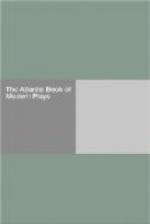A kebbuck is a cheese; keek means peek; toom, empty; a besom, a broom; and soop, sweep.
John Galsworthy: THE SUN
According to Professor Lewisohn and other critics Mr. Galsworthy is without question the foremost English dramatist to-day. Without arguing or attempting to offer solutions, he gives the most searching presentation of problems which we have to face and somehow settle. In Strife, after a furious contest and bitter hardships, the strike is settled by a compromise which the leaders of both sides count as failure. Things are much as they were at the start; the difficulty is no nearer solution. In Justice, “society stamps out a human life not without its fair possibilities—for eighty-one pounds,” because obviously clear and guilty infraction of law cannot go unavenged. Justice is not condemned by the facts shown in this play, nor is its working extolled. In The Mob, the patrioteering element destroys a man who proclaims the injustice of a small and greedy war of conquest. In The Pigeon, brilliant debate is held, but no conclusion reached, as to what we should do with derelict and wasted lives, with men who do not fit into the scheme of success and society.
In his sketches and stories Mr. Galsworthy presents these same problems, and again without attempted conclusions. The Freelands particularly is a most dramatic novel of conditions and results similar to those in some of the dramas mentioned above. Many of his sketches and essays also—for example, “My Distant Relative” in The Inn of Tranquillity and “Comfort” in A Commentary—are of biting and almost cynical irony in viewing proposed and present solutions of problems; but none suggest panaceas. They merely make us think soberly of the size of our problems and their immense complexity, move us to go out to look for more information and to examine carefully our most solid institutions as well as suggested alterations in them.
A large part of Mr. Galsworthy’s time and thought, both during the war and since, has been given to the problem of some measure of justice to soldiers, and particularly to wounded and broken soldiers. In A Sheaf and Another Sheaf appear various papers presenting sharply the conditions of suffering and neglect that actually exist. The Sun is a brief sketch of after-war days,—this time of a wounded man who has gained an advantage over one who escaped injury,—and of joy in deliverance from the hell of war—a joy so profound and luminous that the released soldier cannot let a sharp mischance and disappointment mar his happiness. The whole piece is in the key of Captain Bassoon’s verses after the Armistice:—
“Every one suddenly burst out singing.”
The other two think the happy soldier mad. We are left wondering what the reaction will be from this height of joyful release to the harsh and sombre conditions of workingmen’s life after the peace.




